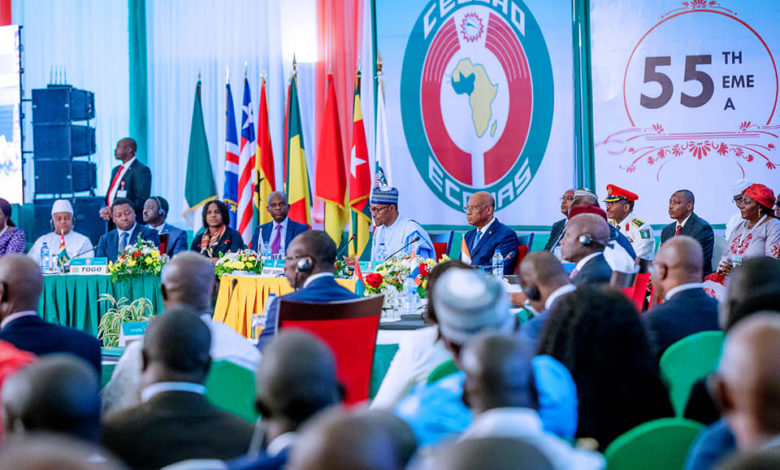Mali Coup: ECOWAS Heads Of State To Hold Extraordinary Summit On Thursday

The Authority of Heads of State and Government of the Economic Community of West Africa States (ECOWAS) will hold an Extraordinary Summit on the socio-political situation in Mali on Thursday.
The Directorate of Communications of the ECOWAS Commission disclosed this in a statement on Wednesday in Abuja.
The summit, which would hold virtually through video conference, was convened following the military coup d’etat that happened in the Republic of Mali on Tuesday.
ECOWAS has strongly condemned the undemocratic change of government as it is against the ECOWAS protocol on Democracy and Good Governance.
The Authority of ECOWAS Heads of State and Government has been mediating in the sociology-political crises and has sent several mediation and peace missions to Mali.
Meanwhile, the United Nations Security Council, on Wednesday, joined a chorus of international voices pressing for a return to civilian rule in Mali after Tuesday’s coup, as an army officer declared himself leader of the mutinying soldiers.
The 15-member council urged troops to return to their barracks without delay.
It stressed an urgent need to restore rule of law and to move towards the return to constitutional order after the overthrow of President Ibrahim Boubacar Keita following months of protests.
The African Union, European Union and the United States (U.S.) have all demanded the junta free the 75-year-old president, Prime Minister Boubou Cisse and other leaders taken captive.
In the Malian capital, Bamako, Col. Assimi Goita said, after meeting top civil servants, that he was the leader of the National Committee for the Salvation of the People that had seized power.
“Mali is in a situation of socio-political crisis.
“There is no more room for mistakes,” Goita said.
Coup chiefs, meanwhile, called on the public to return to normal life, warned against acts of vandalism and threatened to punish any soldier found guilty of extortion.
But they made no reference to the detained leaders or their whereabouts.
The dramatic events in one of Africa’s most volatile countries began early on Tuesday when rebel officers mutinied at a base near Bamako and headed into the city, where they detained Keita and Cisse.
Hours later, Keita beset by angry protests over economic stagnation, corruption and a brutal Islamist insurgency – announced his resignation.
He said he had been given no other choice but to quit, and sought to avoid bloodshed.
Jubilant crowds had cheered the rebels on Tuesday as they arrived in the capital.
There were few visible traces of those events on Bamako’s streets on Wednesday – troops had not been deployed en masse despite the coup leaders announcing a night-time curfew.
The 55-nation AU condemned the unconstitutional change of government in Mali.
“The bloc announced that it was suspending Mali, a rare move that bars a member from attending all summits and meetings until restoration of constitutional order.”
It also called for the release of Keita and other officials, a demand also made forcefully by Brussels and Washington.
Secretary of State, Mike Pompeo, said the U.S. “strongly condemns the August 18 mutiny in Mali as we would condemn any forcible seizure of power.”
“The freedom and safety of detained government officials and their families must be ensured,” he said.
ECOWAS, which had tried in vain to mediate in the long-running political crisis, also said it would suspend Mali from its internal decision-making bodies.
It pledged to close land and air borders to Mali and push for sanctions against “all the putschists and their partners and collaborators”.
The coup leaders had appeared on television overnight to pledge a political transition and new elections within a reasonable time.
In a brief media appearance, junta spokesman and Air Force Deputy Chief of Staff, Ismael Wague, called on Malians to resume their activities in a healthy manner.
Civil servants were invited to return to work on Thursday, he said.
He added that no one had died during the coup, despite unconfirmed reports of several deaths.
“The committee stresses that, during its operations, there were no deaths, contrary to certain allegations that talk of four dead and 10 injured,” Wague said, repeating: zero deaths and zero injured.
Support Our Journalism
There are millions of ordinary people affected by conflict in Africa whose stories are missing in the mainstream media. HumAngle is determined to tell those challenging and under-reported stories, hoping that the people impacted by these conflicts will find the safety and security they deserve.
To ensure that we continue to provide public service coverage, we have a small favour to ask you. We want you to be part of our journalistic endeavour by contributing a token to us.
Your donation will further promote a robust, free, and independent media.
Donate HereStay Closer To The Stories That Matter





What an aberration of sorts. Leadership must be responsible enough to avoid the kind of chaos that heralded the military take over. However, a military junta is not a healthy alternative. An interim regime as it’s in Sudan should be put in place.